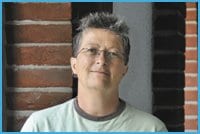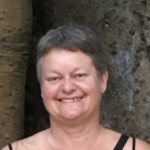Longtime activist Anna Willats is preparing to step into a new leadership role this month: The 51-year-old butch will be leading the Dyke March on Sat, Jun 28 as this year’s honoured dyke.
“It’s very odd for me,” says Willats, “just because I’m more comfortable if the focus is on the issue. It’s very touching and lovely to have people say that I deserve something like this…. I take it that people are thanking me for a lot of work that I’ve done. There are so many dykes doing amazing work and role models in our community.”
Willats has contributed to a wide range of political and social causes in the last few decades, including police accountability and violence against women.
“I don’t have hobbies,” she says. “Organizing is kinda my hobby. It’s the way I’m involved in my community.”
One of the first protests she participated in was the demo to mark the first anniversary of the infamous 1981 bathhouse raids.
“Abuse of power issues, especially with the state, infuriates me,” says Willats, who was a member of the Right to Privacy Committee in the early ’80s, the June 13th Committee in the late ’90s and produced a report for the Toronto Women’s Bathhouse Committee in the wake of the 2000 raid on the Pussy Palace.
But Willats has also made her mark in movements that intersect queer rights. “I’ve been involved in cultural, social and political groups not necessarily in the queer community,” she says. “I feel the queer community is where I live and who I am but a lot of the work I do is around policing and violence against women and antipoverty, which are all things that affect queer people.
“Lots of queer people work on those issues but being queer isn’t out front. [Lesbians] have always been front and centre in women’s antiviolence organizations, and trans people more so recently…. But our lesbianism hasn’t necessarily been front and centre if we’re on a picket line or in a march.”
Willats first came to Toronto from Milton in 1982. She moved in with her grandmother and attended Sheridan College, where she studied architectural drafting. She soon met and fell in love with Mariruth Morton, who she met at Sheridan’s women’s centre.
“I came to Toronto and got exposed to all these things: debates in the lesbian community like SM, butch and femme, race politics, the fact that the women’s antiviolence movement was very white. I got immersed in small-p politics.
“I got involved with some political groups. Mariruth worked for the Rape Crisis Centre so I got involved, first as a client, then I worked with the self-help group, the consciousness-raising group and more. I met a lot of women who I continue to be friends and colleagues with. I found great groups such as Lesbians Against the Right.”
Lesbians Against the Right was a radical lesbian feminist activist organization formed in 1981. It was responsible for the first lesbian pride march, called Dykes in the Street, in October of that same year.
“I remember meeting at the church on Bathurst one block south of Bloor,” says Willats. “It’s a theatre now but in 1982 it was a meeting place for many lefty groups. We held a conference there for dykes in that year.”
Willats has managed to make a career out of her activism, working at TRCC for 17 years beginning in ’82. At that time the organization was more of a “grassroots feminist antiviolence organization,” says Willats. “We provided services and tried to take political action on the injustices women and trans people who called us were experiencing. We were collectively organized and used group and caucus structures to examine class, gender, race, ability and other identities that affect women’s ability to respond to violence against them.
“I worked there when sexual assault and rape came out into public consciousness. We were grassroots. We were radical, not restricted by government at that time. The ’80s allowed for a lot of neat activism. Before amalgamation Toronto was more progressive.”
She was also a courier of sorts, making special deliveries for lesbians looking to get pregnant alongside missives from various activist organizations.
“I was sperm running by motorcycle, delivering press releases when there was no fax or email,” recalls Willats. “We’d print them out and deliver to The Body Politic, etc.”
The common refrain in the ’80s was that the personal is political. It certainly was true for Willats, who built her family as a result of her political ideals.
“Mariruth and I both made commitments to help people with kids and that’s how I learned to have kids,” says Willats. “A bunch of us lived together and coparented. I’ve lived collectively and cooperatively most of the time I’ve been in Toronto.
“I tend to be a bit of a control freak. Living with people tests that. It keeps your rent down. I like building community and family. I like living that way.”
For the past 12 years Willats has been living with her partner Helen Victoros — “the most loving and wonderful partner” — in a house in the Annex. “We’ve got Helen, myself, my daughter and four others, including one [housemate’s] young son.
“It’s easy to get isolated with a partner and the whole picket fence thing,” adds Willats. “It’s nice for my daughter who’s 19. She gets to hang out with other people. My son didn’t like it so much. He is now 22 and lives independently elsewhere in Toronto.”
Willats became an instructor at George Brown College in 2000 where she teaches primarily to female students.
“In terms of longevity I’ve been able to do a great variety of work and haven’t burnt out by doing just one thing,” she says. “I’m a professor in the Assaulted Women and Children Counsellor/Advocate Program. I enjoy that very much.”
Her current work includes an antioppression course that she runs with the Parkdale Activity Recreation Centre (PARC). The program was awarded a human rights award by the city last year.
“Knowledge is Power is a leadership course that includes community works skills,” says Willats. “The goal is to teach people skills that they can use in their life and maybe even in employment…. Most of PARC’s members either have physical disabilities or psychiatric disabilities but are very strong people who are eager to discuss and a joy to work with.”
Willats is also known for her weekly email newsletter, Rise Up, which she’s been distributing weekly since 2000.
“It’s a compendium of cultural and political events and news that would be of interest to people on the left side of the spectrum,” says Willats. “So many people are doing such excellent work and I find we often get into our own thing and don’t know what others are doing, so I do it to help people to connect.
“First Nations’ sovereignty issues need support from queer marriage issues and so on to see the connections with the kinds of oppression people deal with. It also keeps me connected…. I now have about 1,500 people on a list and they often share it with others. It’s probably my control freak coming out.”
Willats says she’s looking forward to leading the Dyke March and is excited to be joined by the Newsgirls Boxing Club, which has been chosen as the honoured group (see Jocks With Heart for more).
“They’re about women’s liberation, breaking down barriers,” says Willats. “They’ve got a great program called Shape Your Life that helps women feel in control of their bodies. Owner Savoy [Howe] is a trailblazer.”
Willats says Pride is a chance to remind ourselves that there’s still work to be done. “A lot of people think everything’s okay for queers but it’s not. A lot of queers get comfortable and forget there’s a lot of queers struggling with poverty and violence and that communities like First Nations are struggling.”
It’s also a time to remember the leaders that we’ve lost. “When I was named the honoured dyke it got me thinking about the wonderful activist women we’ve lost this past year and a half or so — Jane Rule, Chris Bearchell, Kathleen Brindley, Sherona Hall and Bobbi Nahwegahbow. I know there are others that I have forgotten or who I don’t know. So I want to remember them with pride and follow their lead as we march this year.”


 Why you can trust Xtra
Why you can trust Xtra


